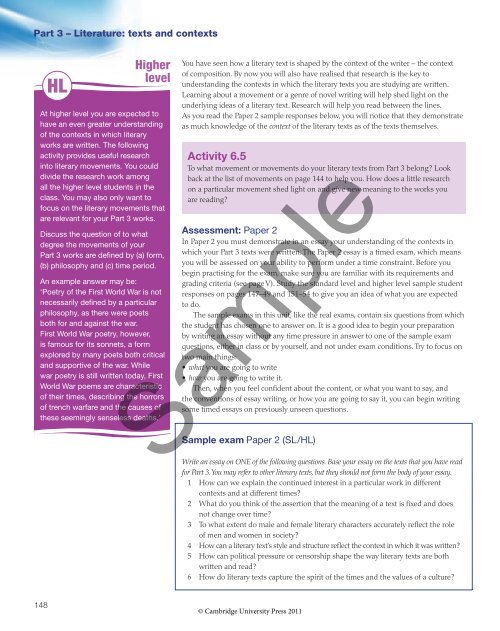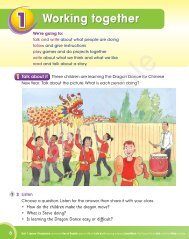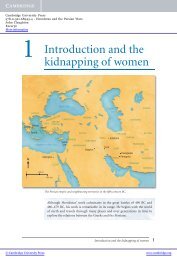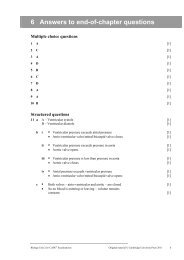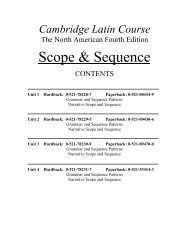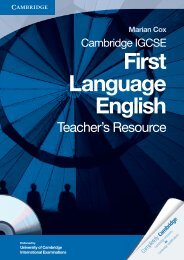Brad Philpot - Cambridge University Press
Brad Philpot - Cambridge University Press
Brad Philpot - Cambridge University Press
Create successful ePaper yourself
Turn your PDF publications into a flip-book with our unique Google optimized e-Paper software.
Part 3 – Literature: texts and contexts<br />
At higher level you are expected to<br />
have an even greater understanding<br />
of the contexts in which literary<br />
works are written. The following<br />
activity provides useful research<br />
into literary movements. You could<br />
divide the research work among<br />
all the higher level students in the<br />
class. You may also only want to<br />
focus on the literary movements that<br />
are relevant for your Part 3 works.<br />
Discuss the question of to what<br />
degree the movements of your<br />
Part 3 works are defi ned by (a) form,<br />
(b) philosophy and (c) time period.<br />
An example answer may be:<br />
‘Poetry of the First World War is not<br />
necessarily defi ned by a particular<br />
philosophy, as there were poets<br />
both for and against the war.<br />
First World War poetry, however,<br />
is famous for its sonnets, a form<br />
explored by many poets both critical<br />
and supportive of the war. While<br />
war poetry is still written today, First<br />
World War poems are characteristic<br />
of their times, describing the horrors<br />
of trench warfare and the causes of<br />
these seemingly senseless deaths.’<br />
148<br />
HL<br />
Higher<br />
level<br />
You have seen how a literary text is shaped by the context of the writer – the context<br />
of composition. By now you will also have realised that research is the key to<br />
understanding the contexts in which the literary texts you are studying are written.<br />
Learning about a movement or a genre of novel writing will help shed light on the<br />
underlying ideas of a literary text. Research will help you read between the lines.<br />
As you read the Paper 2 sample responses below, you will notice that they demonstrate<br />
as much knowledge of the context of the literary texts as of the texts themselves.<br />
Activity 6.5<br />
To what movement or movements do your literary texts from Part 3 belong? Look<br />
back at the list of movements on page 144 to help you. How does a little research<br />
on a particular movement shed light on and give new meaning to the works you<br />
are reading?<br />
Assessment: Paper 2<br />
In Paper 2 you must demonstrate in an essay your understanding of the contexts in<br />
which your Part 3 texts were written. The Paper 2 essay is a timed exam, which means<br />
you will be assessed on your ability to perform under a time constraint. Before you<br />
begin practising for the exam, make sure you are familiar with its requirements and<br />
grading criteria (see page V). Study the standard level and higher level sample student<br />
responses on pages 147–49 and 151–54 to give you an idea of what you are expected<br />
to do.<br />
The sample exams in this unit, like the real exams, contain six questions from which<br />
the student has chosen one to answer on. It is a good idea to begin your preparation<br />
by writing an essay without any time pressure in answer to one of the sample exam<br />
questions, either in class or by yourself, and not under exam conditions. Try to focus on<br />
two main things:<br />
what you are going to write<br />
how you are going to write it.<br />
Then, when you feel confident about the content, or what you want to say, and<br />
the conventions of essay writing, or how you are going to say it, you can begin writing<br />
some timed essays on previously unseen questions.<br />
Sample<br />
Sample exam Paper 2 (SL/HL)<br />
Write an essay on ONE of the following questions. Base your essay on the texts that you have read<br />
for Part 3. You may refer to other literary texts, but they should not form the body of your essay.<br />
1 How can we explain the continued interest in a particular work in different<br />
contexts and at different times?<br />
2 What do you think of the assertion that the meaning of a text is fi xed and does<br />
not change over time?<br />
3 To what extent do male and female literary characters accurately refl ect the role<br />
of men and women in society?<br />
4 How can a literary text’s style and structure refl ect the context in which it was written?<br />
5 How can political pressure or censorship shape the way literary texts are both<br />
written and read?<br />
6 How do literary texts capture the spirit of the times and the values of a culture?<br />
© <strong>Cambridge</strong> <strong>University</strong> <strong>Press</strong> 2011


